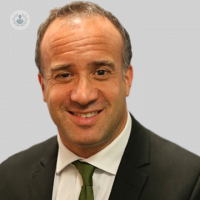Multinodular goitre
Professor Miles Levy - Endocrinology, diabetes & metabolism
Created on: 02-24-2015
Updated on: 04-27-2023
Edited by: Conor Lynch
What is multinodular goitre (MNG)?
A goitre is a thyroid gland that becomes enlarged for any reason. A multinodular goitre (MNG) is the most common disease of the thyroid gland and occurs when several separate lumps, known as nodules, appear in the gland. The thyroid is in front of the windpipe (trachea) and its function is to produce hormones. These hormones are essential for metabolic reactions and normal bodily functions.

What is the disease prognosis
With proper treatment, a multinodular goitre does not usually cause major problems. The biggest complications that can occur are:
- Difficulty swallowing or breathing
- Hyperthyroidism
- Problems associated with thyroid cancer. Some people with a multinodular goitre will go on to develop thyroid cancer.
Symptoms of multinodular goitre
Most multinodular goitres don’t cause any symptoms. If the goitre is quite large, there may be a lump in the central part of the neck, and depending on the size, you may feel some discomfort or difficulties when swallowing. If your thyroid is producing too much thyroid hormone it can cause symptoms of hyperthyroidism, which include:
- Weight loss
- Rapid heartbeat
- Anxiety
- Tremours
- Increased appetite
- Increased sensitivity to heat
- Excess sweating
Medical tests for multinodular goitre
The diagnosis is generally quick and easy, and consists of:
- A physical examination
- Hormone tests
- Ultrasound
- In some cases, an FNA (fine needle aspiration puncture) can be performed
- MRI
What are the causes of multinodular goitre?
Most cases of multinodular are of an unknown cause. There are different reasons why it might appear, including:
- Iodine deficiency — lack of iodine in the diet can cause the thyroid gland to form thyroid nodules
- Thyroid cyst — benign cysts are generally treated but may contain malignant components
- Excessive growth of normal thyroid tissue — the cause of the growth/lump is not always clear and it’s not usually serious
- Chronic inflammation of the thyroid (thyroiditis) — this causes an enlargement of the thyroid
Treatments for multinodular goitre
Treatment is usually based on monitoring the evolution of the goitre. In more serious cases, surgery can be performed. This can also be recommended if the thyroid continues to grow and causes discomfort when speaking, breathing, or swallowing.
Surgical treatment is also carried out when a doctor suspects a presence of cancer since patients with a goitre have a five to 10 per cent chance of developing thyroid cancer.
The recommended surgery is a total thyroidectomy, which removes both the thyroid lobes but tries to preserve the parathyroid gland. After surgery, the function of the thyroid is altered and the patient will need to take hormone supplements.
Which specialist treats multinodular goitres?
Multinodular goitres are usually treated by an otolaryngologist, general surgeon or endocrinologist.





